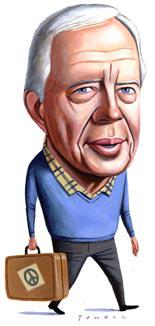Klaus Hergersheimer
Emperor
I'll start:
an older opinion piece, but it has a particular excerpt whose story sort-of grinds my gears a bit, especially when I think about US-presidency-as-a-public-service:

 slate.com
slate.com
[Story goes on to describe him negotiating with North Korea, but that sort-of makes Bill Clinton sound worse for letting him do it in the first place, so I can't fault him too much there.]
Admittedly I wasn't around when he was president. Nor do I think I even felt the effects of his presidency.
But the general vibe I got from him in later years is someone who was maybe "too good" for being in the office. (And that's not necessarily a positive. It's just...being overqualified).
What I mean is I think his commitments to something far greater exceeded what should have been his first loyalties. Perhaps he was a great human being; I'd be fine with that. But being the US president was not the way to do that. And certainly not by using that very office to pad his resume, to undermine a coalition to stop a guy who not only invaded but annexed an Arab League state. (What, you think your average peace group could get an appointment with the Arab League and tell them 'no to war'? Yeah I didn't think so.)
Ok I'm done. Tell me he was good and I'm wrong.
an older opinion piece, but it has a particular excerpt whose story sort-of grinds my gears a bit, especially when I think about US-presidency-as-a-public-service:

Jimmy Carter
Jimmy Carter's post-presidential career has been characterized by a seemingly irresistible impulse to continue the presidency that American voters...
During the buildup to the Gulf War in 1990 and 1991, Carter unsuccessfully worked to undermine the foreign policy of America’s democratically elected president, George Bush. Carter behaved as the Imperial Ex-President, conducting a guerrilla foreign policy operation that competed with the actual president’s. What’s disturbing about this behavior is not that Carter opposed war with Iraq.Many Democrats opposed going to war, and they worked within the American system to try to prevent a war that many predicted would be bloody (which it was, for Iraq). But Carter went further than merely lobbying Congress to oppose military action or speaking out in an effort to tilt popular opinion against the coming war. He used his status as a former president to engage in foreign policy, a deliberate effort to subvert the democratic process.
In November 1990, two months after Iraq’s invasion of Kuwait, Carter wrote a letter to the heads of state of the permanent members of the United Nations Security Council. He urged the countries to drop their support for Bush’s proposed military solution. Instead, as Douglas Brinkley outlines in The Unfinished Presidency, his glowing but not uncritical assessment of Carter’s post-presidential years, Carter asked the countries to give “unequivocal support to an Arab League effort” for peace. (As Brinkley notes, Carter’s anti-war position conflicted with the Carter Doctrine he had outlined as president: Any “attempt by any outside force to gain control of the Persian Gulf region will be regarded as an assault on the vital interests of the United States of America, and such force will be repelled by any means necessary, including military force.”) Right up to Bush’s Jan. 15 deadline for [The Gulf] war, Carter continued his shadow foreign policy campaign. On Jan. 10, he wrote the leaders of Egypt, Saudi Arabia, and Syria and asked them to oppose the impending military action. “I am distressed by the inability of either the international community or the Arab world to find a diplomatic solution to the Gulf crisis,” he wrote. “I urge you to call publicly for a delay in the use of force while Arab leaders seek a peaceful solution to the crisis. You may have to forego approval from the White House, but you will find the French, Soviets, and others fully supportive. Also, most Americans will welcome such a move.” Former National Security Adviser Brent Scowcroft later accused Carter of violating the Logan Act, the law that prohibits American citizens from conducting unofficial foreign policy.
[Story goes on to describe him negotiating with North Korea, but that sort-of makes Bill Clinton sound worse for letting him do it in the first place, so I can't fault him too much there.]
Admittedly I wasn't around when he was president. Nor do I think I even felt the effects of his presidency.
But the general vibe I got from him in later years is someone who was maybe "too good" for being in the office. (And that's not necessarily a positive. It's just...being overqualified).
What I mean is I think his commitments to something far greater exceeded what should have been his first loyalties. Perhaps he was a great human being; I'd be fine with that. But being the US president was not the way to do that. And certainly not by using that very office to pad his resume, to undermine a coalition to stop a guy who not only invaded but annexed an Arab League state. (What, you think your average peace group could get an appointment with the Arab League and tell them 'no to war'? Yeah I didn't think so.)
Ok I'm done. Tell me he was good and I'm wrong.
Last edited:

